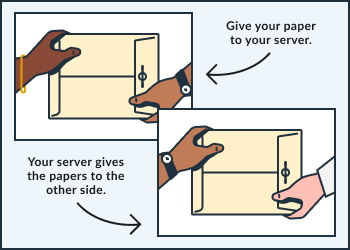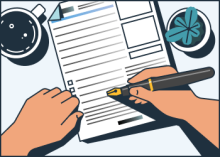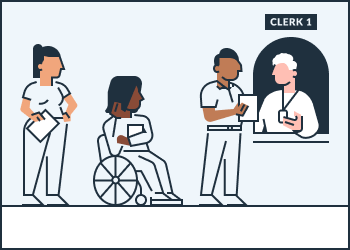Before you start
These instructions explain how to personally serve papers. This means another adult, not you, hands a copy of your Request to the other side (your ex-spouse or child's other parent). This person is your server. Your server must sign a form saying they delivered the papers. You file this form with the court.
If your server mails the forms, the deadline is earlier. Unless the court orders a different time to serve, your server must mail the papers at least 16 court days plus 5 calendar days before your court date. A court day is a day the court is open (Monday through Friday, excluding court holidays (opens in a new tab)).
The server then needs to fill out and you need to file a Proof of Service by Mail (form FL-335) (opens in a new tab).
If you have questions about whether you can do mail service, talk to your court's self-help center. They can answer questions about serving court papers.
How to personally serve a Request to set aside support
🔗 All links below open in a new tab.
-
Choose a server
You can't serve papers yourself. Ask another adult – a server – to deliver the papers.
Your server must be:
-
18 or over, and
-
Not part of your case
Your server can be:
-
Someone you know
-
The county sheriff (in most, not all, counties)
-
A professional process server you hire
The sheriff charges to serve papers unless you have a fee waiver.
-
-
Figure out deadline to serve
📅 Unless the court orders a different time to serve, your server must personally serve the papers at least 16 court days before your hearing.
A court day is a day the court is open (Monday through Friday, except court holidays).
Take out a calendar and find your court date (it’s listed on the first page of your Request).
-
Count backwards on the calendar 16 court days (Monday to Friday, not including any court holidays). Start counting with the hearing date (it’s day zero).
-
Stop when you get to the 16th court day. That’s your deadline.
Your server needs to hand-deliver the papers on or before this date.
-
-
Have your server deliver the papers to the other side

Your server must find the person and hand the papers to them by the deadline. If the LCSA is involved in your case, you server must deliver a copy to them as well.
Your server hands them:
-
Copy of your Request for Orders and any attachments
-
A blank Responsive Declaration to Request for Order (form FL-320)
-
Any other papers you filed (except any fee waivers)
-
A copy of your proposed Response, if you needed to complete one
Tell your server to write down the date they handed them the papers. Your server needs this date to fill out the Proof of Service form.
If the other person won’t take the papers, your server may leave them by the person and tell them what they are. For example, your server can leave them on the ground next to them and say, "These are important legal papers for you."If there's a judgment in your case, your server must hand your ex-spouse or the other parent the papers, not their lawyer. If there's not a judgment, then our server must give them to the lawyer. -
-
Have your server complete the Proof of Service form

- You can use Proof of Personal Service (form FL-330). It helps if you fill in the top part of the form with the case and court information.
- Your server can then fill in the information about how, when, and where they served the papers.
- If they also served the LCSA, they will need to complete a separate form with how, when, and where they served the LCSA.
- Your server must sign the form.
-
Copy and file the Proof of Service form

-
Make a copy of your Proof of Service.
-
File the original and the copy with the court where you filed the papers at least 5 court days before your hearing date. The court will stamp and return the copy.
-
Keep the copy of the Proof of Service for your records.
-
Ask to set aside an order or judgment
What's next
Once you’ve served your Request, learn about what to expect at your hearing so you know how to prepare.

